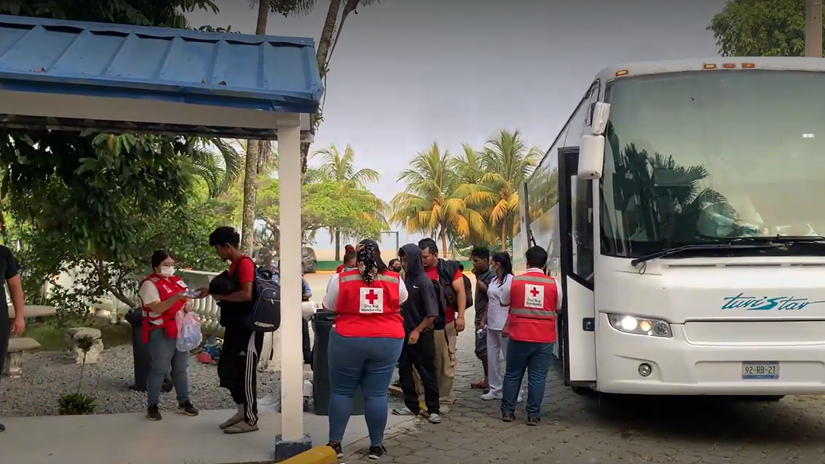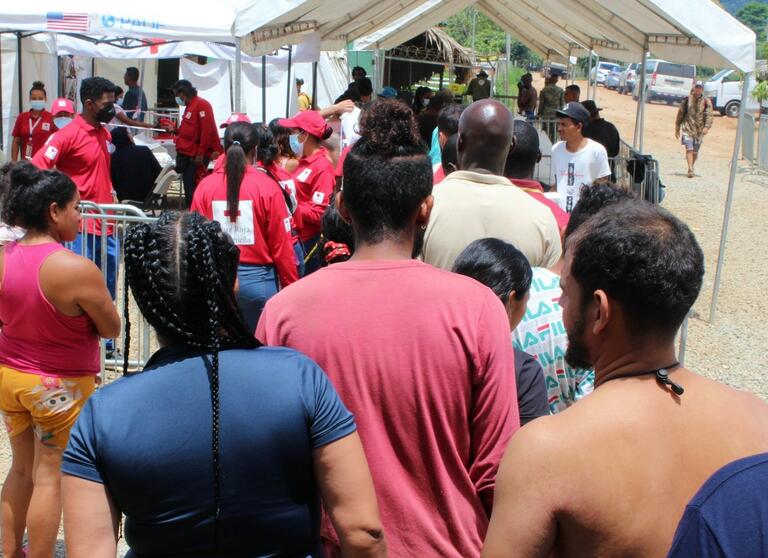Máximo and George are two brothers from Honduras who, faced with unemployment and a lack of opportunities, took the difficult decision to migrate northwards in search of a better future.
Their journey towards their dream life, however, did not go as planned.
"We were stranded, with no money, with nothing, but we kept walking. We had no money for the bus, nothing, but we decided to take the risk. On the way we were assaulted and we were extorted, we almost lost our lives. They pointed a gun at us and told us ‘you pay us, or else we’ll put you in a body bag'," explains George.
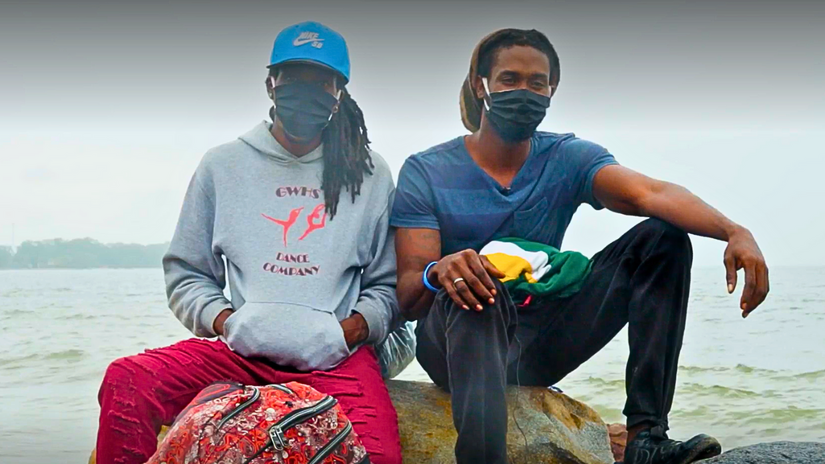
Brothers Máximo and George sit on a rock with their backs to the sea at the Centre for Attention to Returned Migrants (CAMR) in Honduras.
Photo: IFRC/Honduran Red Cross
Stories like this are sadly all too common along the Central American migratory route. Violence from criminal gangs, rising unemployment and cost of living, among other reasons, are all encouraging people to migrate—not only from south to north, but also from north to south.
Honduras is a territory of origin, return and transit for migrants. Every day, hundreds of people, sometimes thousands, leave the country. Many others cross it on their way to North America, and many others return to the country when they encounter the same problems abroad that they were trying to flee at home.
In 2023, more than 56,000 Honduran migrants like Maximo and George returned to their country, equivalent to over 150 people per day.
"One of the reasons people return, according to the interviews we have conducted, is to be reunited with their families,” explains Nicol Palacios, Protection Assistant at the Centre for Attention to Returned Migrants (CAMR) in Omoa, north-west Honduras.
“The challenges they face on the migration route have a great influence: suffering violence, the long distances they have to walk, spending the night in the street, not having food or at least not the food they are used to in their country. Tiredness is also another reason why they stop; and if they feel dejected, they decide to turn themselves in to the authorities so that they can be returned to Honduras,” she adds.
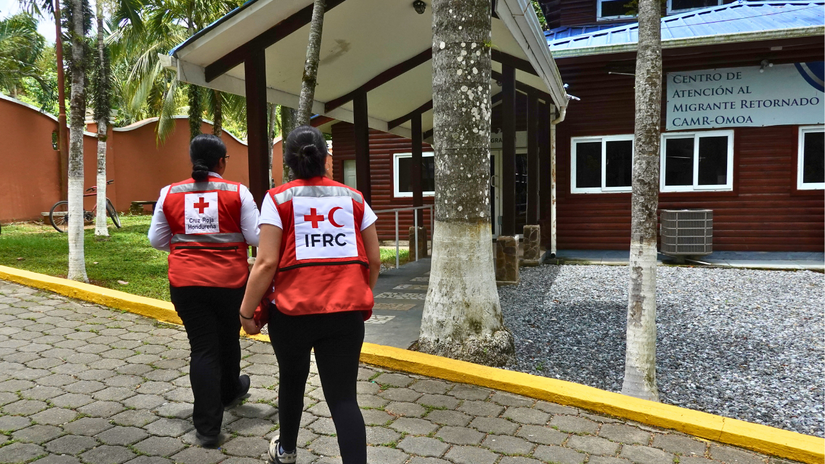
Honduran Red Cross and IFRC staff walk to the offices of the Centre for Attention to Returned Migrants (CAMR) in Honduras.
Photo: IFRC
From the Corinto border between Honduras and Guatemala, the Honduran Red Cross (HRC) transports migrants and returnees to the CAMR in Omoa, where they receive support from staff and volunteers from the Red Cross and National Migration Institute.
"This Centre gives returnees the opportunity to feel a warm embrace when they return to their country", says Mario Alberto Ávila, Director of the CAMR.
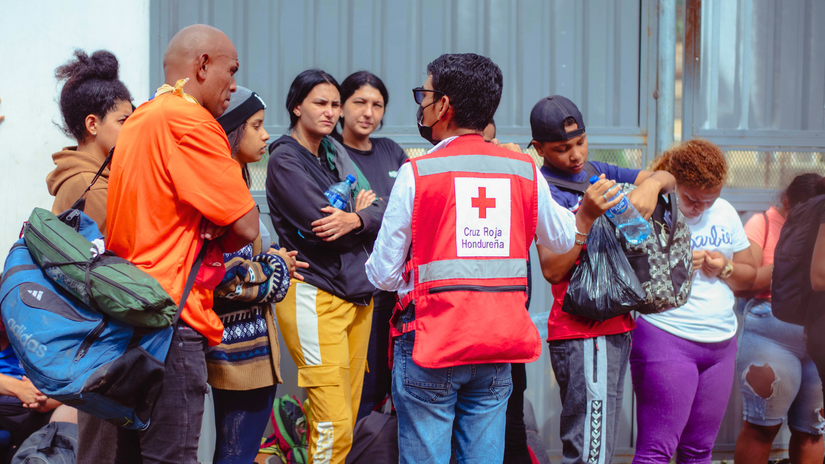
A Honduran Red Cross volunteer provides information to migrants lining up to access different kinds of humanitarian assistancee in Honduras.
Photo: IFRC
Meanwhile, further south in the small town of Belen, the Honduran Red Cross partners with the local government to run a care centre for unaccompanied migrant children and families returning home.
"All the cases in the centre are tough to listen to, all of them. People come in frustrated and upset because they did not achieve their objective of reaching their destination,” says Gabriela Oviedo from the Honduran Red Cross who runs the care centre.
“What has had the greatest impact on us is looking after babies who are only days or months old; children who don't even know how to speak. We welcome them at the centre and give them the loving treatment they deserve until we can hand them over to their waiting family members," she adds.
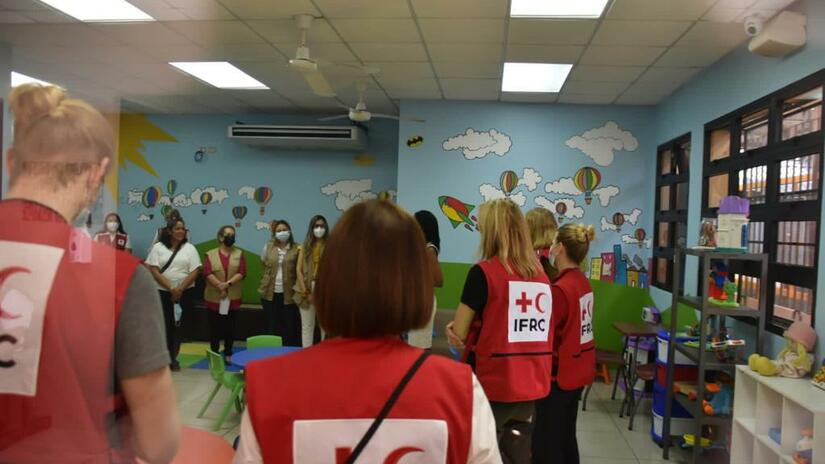
A team from the IFRC meets at the Center of Attention for Migrant Children and Families, located in Belen, Honduras.
Photo: IFRC
Saving lives and addressing the needs of migrants along the Central America migratory route is becoming increasingly urgent. The IFRC's priority in the region is to provide people on the move with quality assistance tailored to the specific needs of the most vulnerable groups—regardless of people’s migration status or the reasons why they’re on the move.
For Marilyn, a young mother from Honduras, it was losing her job due to the COVID-19 pandemic and then losing her home in floods caused by Hurricanes Eta and Iota in 2021 that pushed her to seek a better life elsewhere.
But being separated from her two children, who she left with her mother, was not easy. Marilyn attempted to head to North America several times, but never made it to her destination. During her migration attempts she experienced muggings, hunger, breaking her feet, and a boat capsizing.
"My dream is in about 5 years to have my own house. To set up my own business and for my children to be well, to put them to school. I want them to have better opportunities than I had", says Marilyn.
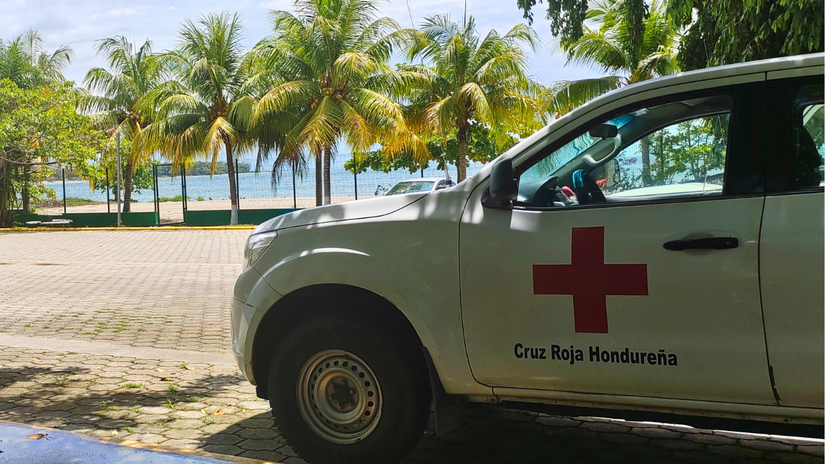
A Honduran Red Cross vehicle is parked in the parking lot of the Centre for Attention to Returned Migrants (CAMR) in Omoa, north-west Honduras.
Photo: IFRC
The IFRC network strives to provide assistance and protection to returnees like Marilyn, Máximo and George who are looking for a better future.
From July 2022 to May 2023, our emergency appeal addressing the migration crisis in Mexico and Central America has enabled the Honduran Red Cross to provide health services, psychosocial support, water and sanitation services, and cash assistance to more than 59,000 people.
As the number of people on the move through Central America continues to rise, the challenge is daunting. But we will continue to defend migrants’ rights and dignity and provide them with vital humanitarian services—whoever and wherever they are.
--
Learn more about the IFRC's work supporting people on the move.

